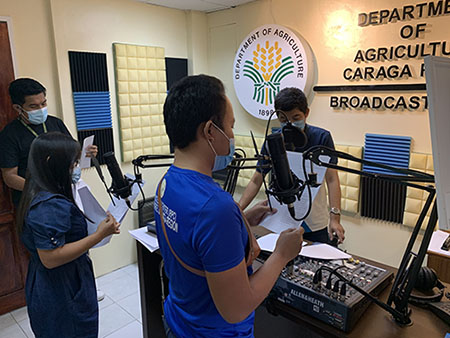 |
When you think about radio dramas and you are Visayan, you would probably recall Handumanan sa Usa ka Awit or Kini ang Akong Suliran of the 70s and 80s. Radio drama may seem like a thing of the past, but they are still a great way to tell stories these days.
In the field of agriculture, producing appropriate Information, Education, Communication (IEC) materials in the form of radio drama is a creative way to inform the farmers and other agriculture stakeholders of new farming technologies.
This is why the Department of Agriculture-Caraga together with the Agricultural Training Institute-Caraga and the Philippine Rice Research Institute-Agusan came up with the production of agri-related radio drama for the forthcoming School-on-the Air on Smart Rice Agriculture (SOA-SRA).
Regional Agriculture and Fishery Information Section Chief Emmylou T. Presilda said that incorporating radio drama in SOA is a tool to inform and at the same time provide entertainment to the listeners.
“The infotainment approach is our way to attract and hold the attention of the learners by engaging their emotions through the stories. Radio dramas were produced to help demonstrate how the modern climate-smart rice agriculture technologies can help the farmer-students to improve their production,” said Presilda.
Presilda added that other communication tools like mobile or smartphones will be integrated to serve as a platform for dialogue, to further the discussions on topics that interest listeners, and create an engaging and interactive program.
SOA-SRA is a nationwide initiative of the Department of Agriculture as a complementary tool to the existing approaches in reaching and interacting with farmers. The program covers a range of topics and integrates scientific information appropriately packaged for the rice farmers in each region. (Rhea C. Abao, DA-Caraga RAFIS)






